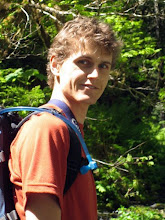I've discovered that I have a strong preference for traveling in places where I know the local language. Hence, Romania has been top on my list of favorites for this trip. Still, Český Krumlov defies this trend, instead rivalling the best Romania has to offer.
Český Krumlov [pronounced Chesky Crumlow] is a small Czech (as the name suggests) town near the Austrian border. Its character is based on a swiftly snaking river, a charming town of red roofed houses, and an old castle resting upon the tops of sharply cut cliffs. The town lies on a narrow strip of land bounded on three sides by the Vltava river. This river very nearly takes a shortcut through town, at one point, but is instead carefully controlled and preserved on its winding course by a series of spillways and small dams.
Incidentally, the Vltava river is sometimes referred to by another name, the Moldau. In and around the area, a rare-ish gem takes its name from the river (or perhaps the river from the gem): Moldavite. The gem is not particularly valuable to mainstream jewelers, but it has a rich green color and is quite appealing regardless of whether it has been intricately faceted or left uncut. In most of the town's stores, especially in the town center, the amount of silver or gold used in the setting will determine 90% of the price. Information on this stone can be found, like most other information, in the Hitch-Hiker's Guide.
As far as sights go, there are few extraordinary guide book stops in town. Most guide books will point visitors to such riveting destinations as the wax museum or the castle grounds, the latter of which actually is rather beautiful. If visitors to Český Krumlov are expecting Prague- or Paris-style attractions, I recommend Prague. Or Paris. Český Krumlov is, instead, for those seeking a more relaxed and quiet place to rest their heads or to sip the local brews. The area surrounding this small town is remarkable in a very Wordsworthian sense, and could easily occupy days or weeks on an itinerary.
There is little more to say about this small town. It was difficult to leave, especially knowing that the remainder of the trip would be in a country altogether more familiar than prior whistle stops. To be fair, Germany would surprise us in many ways, but it always felt rather like home.
Coming soon: Germany (one BIG post for the whole week).
Happy. Thank you. More Please.
13 years ago


3 comments:
Thanks for letting me live vicariously through your journeys.
Hi there Jeff. I'm envious as I miss my Peace Corps days. Being an RPCV myself (Malawi 1991-1993), when I wanted to find some info on Moldova, I thought asking a PCV there would be a great source. A friend and I will be coming to Moldova for a month in Sept for a bike tour. We'll cover as much of the country as we can on our bikes in 4 weeks, from south to north. I was wondering: If I want to try to learn a few phrases like "thank you" and "where is the toilet?", would it be best to learn them in Russian, or in Romanian? I'll probably send this similar message to a couple of your fellow PCVs and see if anybody responds. Thanks much, Leigh Anne
p.s. My e-mail is leigh_71025@yahoo.com
Take care...Leigh Anne
Post a Comment